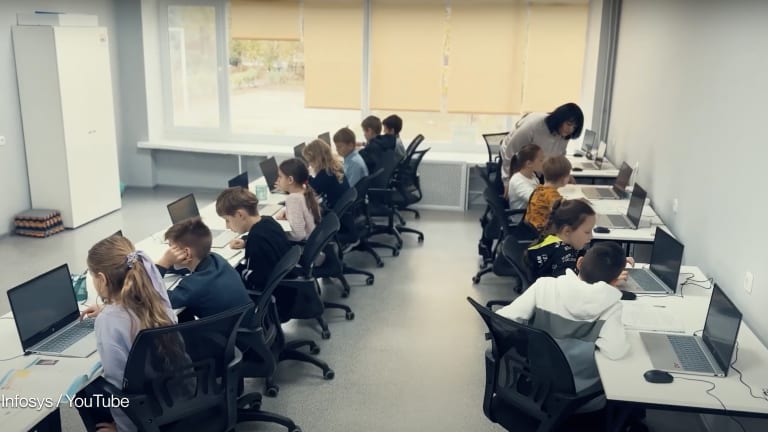
As the global development finance landscape continues to evolve, many NGOs that in the past would have never considered working with the private sector are increasingly looking to companies that want to do good to collaborate in their projects.
But why, though, are some firms willing to work more with some nongovernmental organizations than others, and what do can development professionals need to know to help them rally private sector support for their causes?
Following the European launch of the Global Youth Wellbeing Index in London, Devex sat down with a representatives from the for-profit and nonprofit sectors to learn more about how NGOs can partner successfully with businesses. The index is produced by the International Youth Foundation with support from global hospitality hotel chain Hilton International, a perfect example of a successful, long-standing partnership to address youth unemployment around the world.
Both sides agreed NGOs must be more strategic and thoughtful when trying to create partnerships, and offered seven tips on how to make these work.
1. Target a business that has a stake in your organization’s key issues.
Caroline Meledo, Hilton Worldwide corporate responsibility manager for Europe, the Middle East and Africa, made it clear that when an NGO is looking for a partner company, it must consider if the two entities’ “issues” align.
For example, an estimated 75 million young people around the world are unemployed. At the same time, increasing social mobility is prompting a rise in travel. The hospitality sector expects this will create an extra 75 million jobs over the next eight years. Hilton Worldwide needs to connect unemployed youth with those vacancies.
“There is no way Hilton, however big it is, can tackle youth unemployment by ourselves,” Meledo explained. “That’s why we need partners.”
As a result, the company joined forces with IYF, which already had a program that trains young people in life skills and prepares them for employment. IYF adapted its Passport to Success curriculum to suit the needs of the hospitality industry. Hilton piloted the scheme in Saudi Arabia, where it is building 20 hotels and needs 15,000 new workers.
“The issue has to be strategically linked to what we do,” Meledo stressed. “We get a lot of requests to support breast cancer and pet shelters — but out of all the issues in the world, these do not impact our operations and we have to be focused to have real impact.”
2. Don’t see a company as a cash cow — consider what skills its employees have and how they can benefit your work.
“We are working partners, not funders,” Meledo noted. “When I receive a proposal saying ‘Here’s what we do, just write us a cheque, and goodbye,’ I automatically say that doesn’t work for us. This is not how we can make a difference — our comparative advantage is not donating money.”
Instead, she recommends NGOs look into how the two bodies can combine skills to tackle a problem. The outcomes of the partnership must meet both the charity’s and the business’ aims. Hilton International EMEA Vice President Stephen Cassidy agrees with this approach.
“I can provide work experiences, training and skills development,” he said. “But we need to work across government and with development organizations about how we can create that pipeline in advance.”
3. Work together with the company to co-design a program.
For IYF President and CEO William Reese, implementers need to understand how businesses operate and co-develop action plans that respond to the company’s changing needs.
He explained that unlike governments and nonprofits that can continue operating even if they make mistakes (because they may receive funding from committed donors or taxes), corporations have to “continue to learn and respond to changing needs because if they do not, they go out of business.”
For this reason, Reese calls on NGOs to always keep the businesses’ objectives in mind, and be clear that within the partnership activities will be co-designed and co-managed.
“If Hilton wasn’t interested in youth because they need future employees, we wouldn’t have a partnership,” he said. “If they didn’t think we had something we can give them, it wouldn’t work.”
4. Consider the broader picture — businesses need to invest in local communities as well as their core purpose, which could present opportunities for NGOs.
“Who would want to come to a hotel in a derelict, poor, unsafe area?” asked Meledo.
To address issues such as poverty and community instability in the countries where Hilton operates, staff are encouraged to take part in volunteering. For example in the United Kingdom the company partners with FareShare, a charity that redistributes surplus food from the food and beverage industry to community organizations such as women’s shelters or children’s breakfast clubs.
Hilton staff deliver the food, and while food delivery is not a core skill of hotel workers, Meledo pointed out the activity benefits the company. As well as tackling societal issues that could undermine hotels’ business, the volunteers also learn about food waste.
“When they come back into the hotels, the way they look at how we manage food is drastically different,” she said.
Suggesting voluntary opportunities to company workers that benefit both NGOs and the business’ staff is one way to tap into the broader support the private sector can offer.
5. Ask for goods in kind.
Business donations don’t always have to be financial — companies can offer goods in-kind or time and expertise.
Meledo explained that Hilton hotels throughout the Middle East, Africa, Europe and Asia donate surplus towels and linen when they are no longer of five-star quality. Used soap is also donated to social enterprise schemes in countries including the United Arab Emirates, Kenya and Egypt, which can recycle the soap or distribute it to other organizations.
Reese adds that through IYF’s partnership with Hilton, the organization receives advice and guidance from Hilton’s top bosses who offer their expertise and time for free.
6. Consider what a business can offer during a crisis.
A partnership might only be valuable to a business under certain conditions, such as a natural disaster or during conflict. If a company’s business is affected by a crisis, an NGO might be able to help it get back on its feet.
Following the 2004 Indian Ocean tsunami, Reese recalled, IYF was working with a global company that wanted to give the organization money to do relief work in affected countries, but Reese negotiated a plan that better suited IYF’s expertise. Instead they designed a five-year project to rebuild the economies of wiped-out villages through offering job training and helping young people create small business startups. This would be beneficial for investors in the long term.
“Each of us in these emergencies has to figure out, do we have a dog in this fight?” recommends Reese, who said NGOs should consider what businesses could donate beyond funding. “People, technology, intellectual property, equipment or relationships … some businesses are as much a supply chain as they are their own businesses.”
Meledo added that businesses can also set up donation pages and collect funds from staff. Hilton matches donations it receives when holding such fundraising activities, as it did recently for the international response to Ebola in West Africa. The firm then partnered with international nonprofit Global Impact to decide which implementing partners on the ground should receive support.
7. Don’t knock on the obvious doors.
Finally, finding a good private sector partner requires research. “The great companies that are more visible in giving money, time and whatever else, get hit up by everyone and they can’t help everyone,” said Reece. Instead, NGOs should look for less obvious choices, even if this might take more time and effort.
Can you think of other ways NGOs and business can work better together? Please let us know by sending an email to news@devex.com or leaving a comment below.
Join Devex to network with peers, discover talent and forge new partnerships in international development — it’s free. Then sign up for the Devex Impact newsletter to receive cutting-edge news and analysis at the intersection of business and development.








